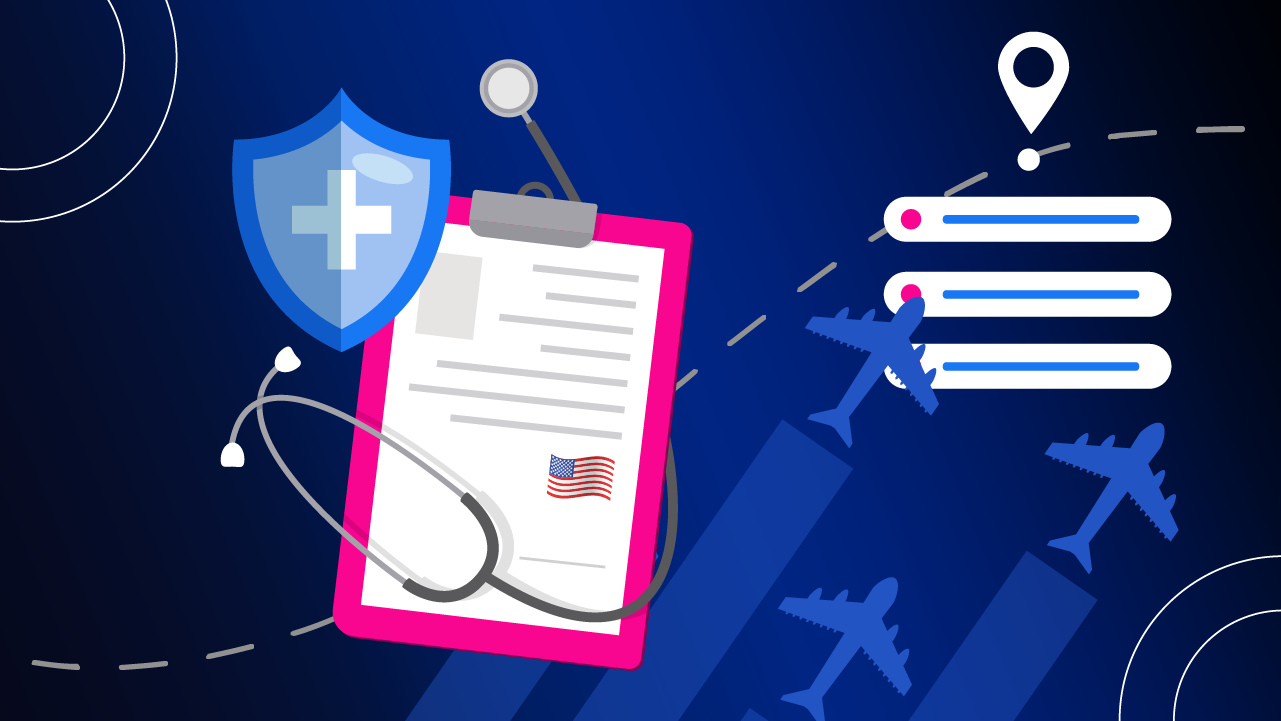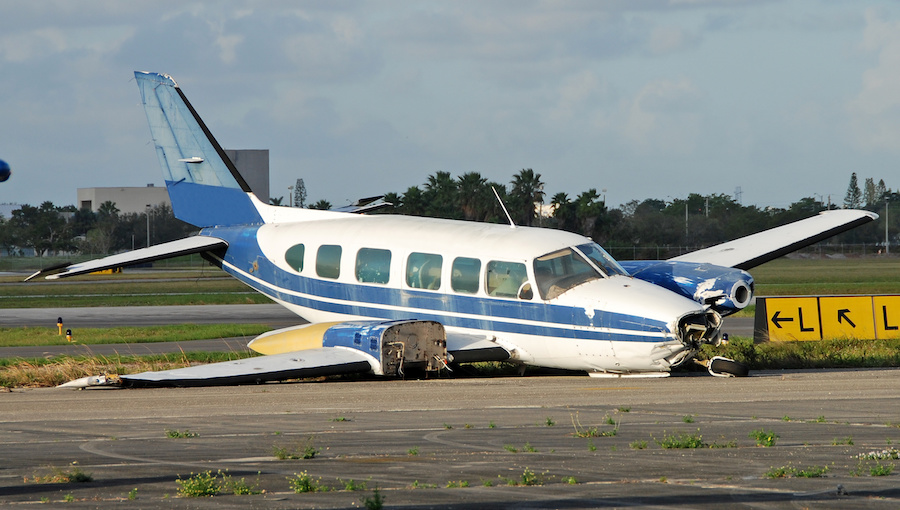-
What Is an FAA Medical Certificate?
-
Types of FAA Medical Certificates
- First-Class Medical Certificate
- Second-Class Medical Certificate
- Third-Class Medical Certificate
- BasicMed
-
FAA Medical Certificate Duration
-
FAA Medical Certificate Requirements
- General Requirements
- Disqualifying Conditions
-
Renewing and Maintaining Your Medical Certificate
-
Medical Certificates and the Sport Pilot Certificate
-
Conclusion
As pilots, we are responsible for keeping our health to an expected medical standard.
Securing an FAA Medical Certificate is one of the first crucial steps you must undergo in your journey to become a pilot.
You might be asking yourself, where do I begin?
Thankfully, this article will cover everything you need to know about FAA Medical Certificates.
What Is an FAA Medical Certificate?
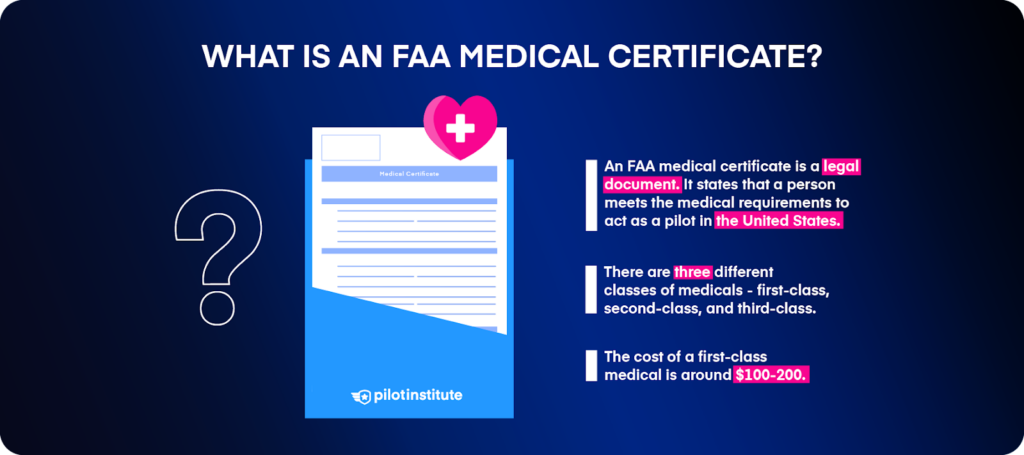
Before you start learning to fly, you know you need to get an FAA Medical Certificate.
But what are they, and why do we need them?
An FAA medical certificate is a legal document issued by the FAA.
The purpose of the medical certificate is to ensure pilots and flight crew in the United States are medically fit and do not pose a risk to public safety.
There are three classes of medicals: first-class, second-class, and third-class. Each class meets the requirements for different flight operations. We will cover the requirements shortly.
The typical cost for a first-class medical is around $100-$200. The price depends on the Aviation Medical Examiner (AME). Your AME can issue the certificate on the day of your medical exam.
Types of FAA Medical Certificates
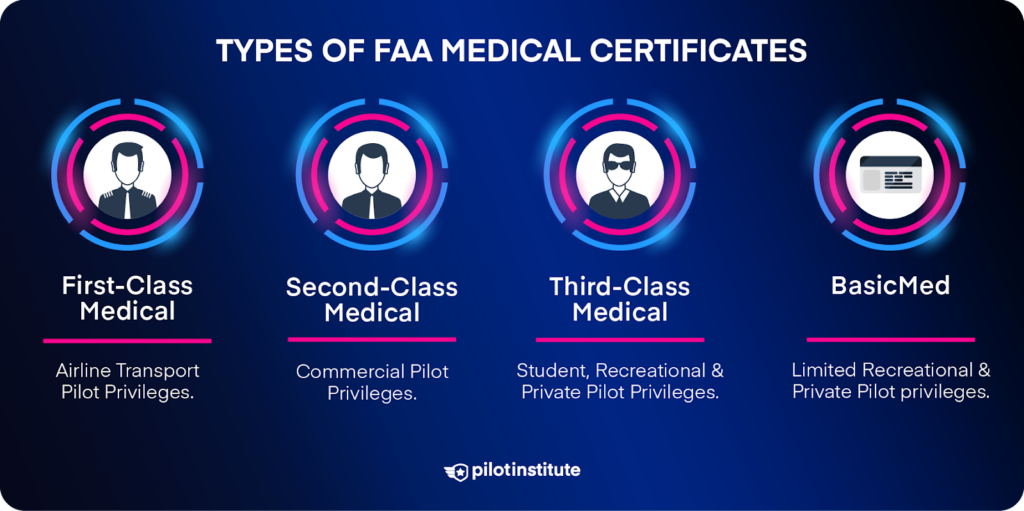
Your aviation goals and aspirations will dictate which medical certificate you need.
If you want to fly privately, then you only need a third-class medical. If you want to fly commercially, you will need a first-class or second-class medical.
This may sound confusing. But don’t worry. We have summarized each type of medical certificate so you can see which class suits you best.
First-Class Medical Certificate
First-class medical certificates are for Airline Transport Pilot (ATP) certificate holders. You must hold this medical class:
- When exercising the pilot-in-command (PIC) privileges of an ATP certificate.
- When serving as a required flight crew member in an airline operation if 60 years old or older.
- When exercising second-in-command (SIC) privileges of an ATP certificate in an airline operation requiring three or more pilots.
You must have good overall health, specifically 20/20 distant vision.
If you are applying for a first-class medical certificate for the first time and you are 35 years old or older, you will need to undergo an electrocardiogram (ECG). Once you turn 40 years old, you will need an annual ECG as part of your first-class medical exam.
For first-class privileges, the first-class medical is valid for 12 months if you are under 40. It’s valid for 6 months if you are 40 or older.
Second-Class Medical Certificate
Second-class medical certificates are for Airline and Commercial Pilots. You must hold this class of medical:
- When exercising the second-in-command (SIC) privileges of an ATP certificate in an airline operation.
- When exercising the privileges of a commercial pilot certificate (flying for compensation or hire).
Like the First-Class medical certificate, good overall health is essential. This includes having 20/20 distant vision.
For second-class privileges, the second-class medical is valid for 12 months, regardless of age.
Third-Class Medical Certificate
Third-class medical certificates are for Private and Recreational Pilots. This certificate is required for:
- Private Pilots.
- Recreational Pilots.
- Student Pilots.
- Flight Instructors (when acting as PIC or required flight crewmember).
- Pilot Examiners.
Vision requirements are more lenient for this class, only requiring 20/40 distant vision.
This certificate is valid for 60 months if you are under 40. It’s valid for 24 months if you are 40 or older.
BasicMed
BasicMed is for pilots who want to exercise the privileges of a third-class medical without holding one.
To be eligible to operate under BasicMed, you must:
- Hold an FAA Certificate.
- Undergo a physical exam.
- Complete a BasicMed Medical Education Course.
- Have never been denied a medical and have held at least a third-class medical certificate at some point after July 14th, 2006.
- Hold a valid US Driver’s License.
Flying under BasicMed involves some restrictions. BasicMed pilots cannot:
- Fly for compensation or hire.
- Fly above 18,000 feet MSL or at an airspeed greater than 250 knots.
- Operate aircraft with more than six occupants (five passengers).
- Operate aircraft with a maximum certificated takeoff weight of more than 6,000 lbs.
BasicMed certification is valid for 48 calendar months after the date of the exam. Pilots must complete an online medical education course every 24 calendar months.
For more information, check out our BasicMed Guide.
FAA Medical Certificate Duration
Each class of medical certificate has different validity periods. The validity period depends on which privileges you are carrying out and your current age.
The chart below shows the validity period for each medical certificate. As you can see, once you reach age 40, the frequency you have to carry out a medical examination increases in all classes except second-class.
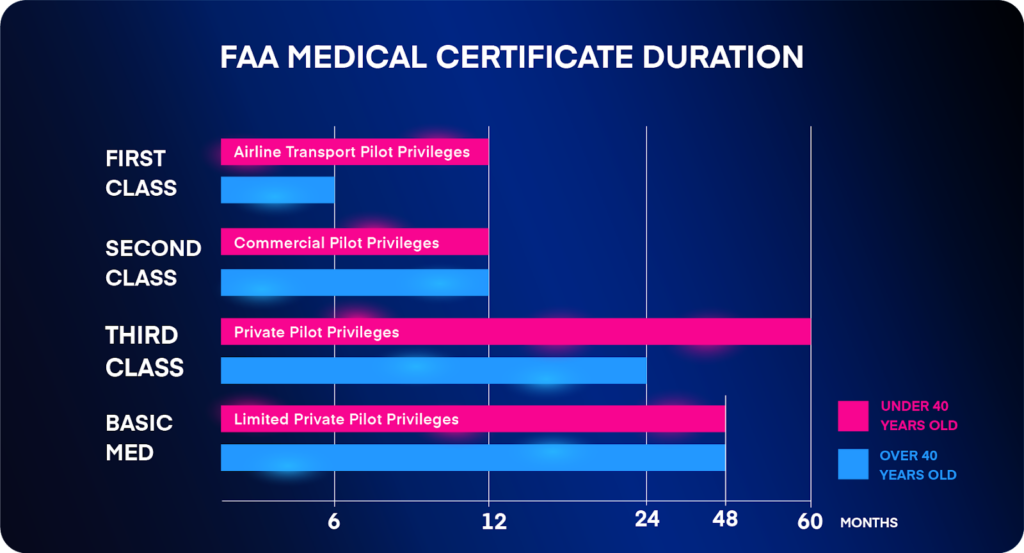
FAA Medical Certificate Requirements
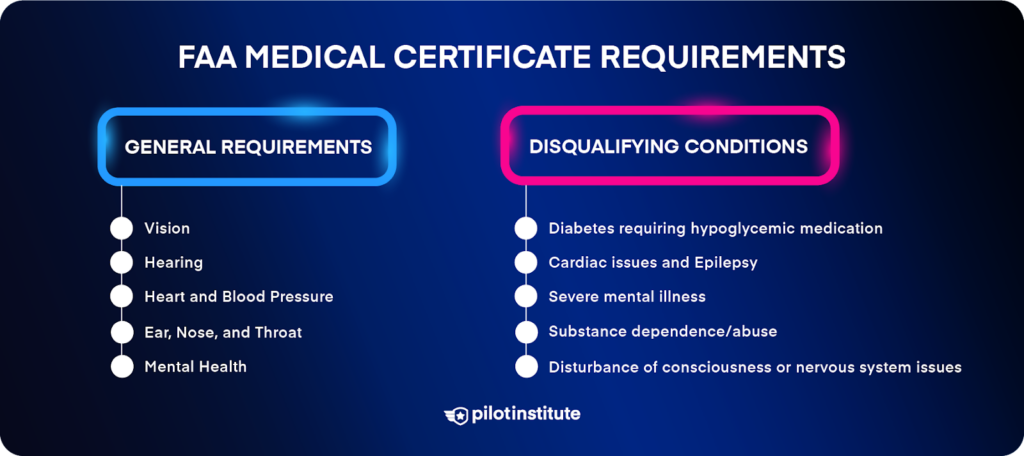
Medical exams can be daunting. But, the good news is that over 90% of applicants pass the physical exam.
Each class has slightly different requirements. The first-class certificate is the most restrictive.
In general, you must be reasonably healthy. You must have no major health issues that may affect your ability to fly.
Let’s review the main requirements for obtaining a medical certificate.
General Requirements
Vision
You will be required to have:
- Distant Vision – 20/40 or better in each eye separately, with or without correction (20/20 for first and second class).
- Near Vision – 20/40 or better in each eye separately, with or without correction.
- Intermediate Vision – 20/40 or better in each eye separately, with or without correction (no requirement for third-class).
- Color Vision – Ability to perceive those colors necessary for the safe performance of airman duties.
Hearing
You will have to be able to:
- Hear an average conversation in a quiet room with both ears, at six feet, with your back turned to the examiner.
- Pass the audiometric speech discrimination test.
Heart and Blood Pressure
You will undergo tests to determine the following:
- You have no problems with your pulse.
- Your heart is healthy.
- Your blood pressure is in the normal range (current max value is 155/90).
- You can pass an ECG test (this is tested for first-class medicals if you are 35 years or older on applying or annually after 40).
Ear, Nose, and Throat
The AME will examine your upper respiratory system to ensure no sign of disease, blockages, or damage. This is to ensure there will be no issues with your vestibular system while flying.
Mental Health
Your examiner will ask you about your mental health. This includes any history of psychosis, bipolar disorder, or severe personality disorders.
Disqualifying Conditions
If the applicant has a history of any of the following conditions, the medical examiner must deny or defer the application:
- Diabetes requiring hypoglycemic medication.
- Angina.
- Coronary heart disease.
- Myocardial infarction.
- Cardiac valve replacement.
- Permanent cardiac pacemaker.
- Heart replacement.
- Psychosis.
- Bipolar disorder.
- A personality disorder that is severe enough to have repeatedly manifested itself by overt acts.
- Substance dependence.
- Substance abuse.
- Epilepsy.
- Disturbance of consciousness without satisfactory explanation of cause.
- Transient loss of control of nervous system functions without satisfactory explanation of cause.
Renewing and Maintaining Your Medical Certificate
Keeping your medical certificate current is extremely important. Without a current medical certificate, you can’t exercise the privileges of your airman certificate.
To maintain your medical certificate, you must remain in good physical health. Exercise and a healthy diet are crucial for long-term health, especially if your job relies on it. You must notify your AME of any changes to your health or medical condition.
Renewing your medical certificate is straightforward. Pilots can apply for certification through FAA MedXPress. It is an online version of the FAA Form 8500-8. The FAA created MedXPress to expedite the process of applying for and renewing a medical certificate. This way, you can spend less time with the AME.
After you fill out the forms, you can book an appointment with a local AME. They will renew your medical certificate.
Medical Certificates and the Sport Pilot Certificate
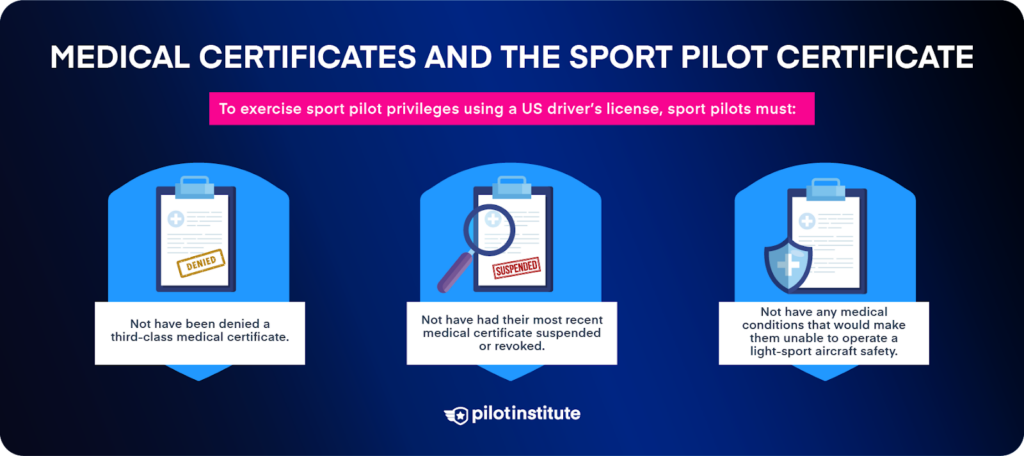
A sport pilot certificate lets pilots operate light sport aircraft. To meet the medical requirement for this certificate, you must have either a third-class medical or a US driver’s license.
To exercise sport pilot privileges using a US driver’s license, sport pilots must:
- Not have been denied a third-class medical certificate.
- Not have had their most recent medical certificate suspended or revoked.
- Not have any known medical conditions that would make them unable to operate a light-sport aircraft in a safe manner.
Conclusion
The FAA uses the medical certification process to determine whether a pilot is fit and safe to fly.
Not everyone meets the medical requirements to become an airline pilot. This is why the FAA offers medical certificates that meet the needs of each pilot. This flexibility makes aviation as inclusive as possible while keeping the skies safe.
Want to know more information about BasicMed?
If so, check out our BasicMed Guide for everything you need to know about flying under BasicMed.
